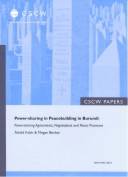An eleven-year civil war broke out in Burundi in June 1994 and concluded in August 2005. Between 1994 and 2005, numerous rounds of peace negotiations were initiated. Three major agreements including provisions for power-sharing were signed, but implemented with varying degrees of success.
Burundi’s first attempt at introducing political power-sharing institutions in 1994 was a failure. The power-sharing agreement, known as the Convention of Government, introduced a coalition government based on power-sharing between the Hutu and Tutsi dominated political parties and opened for ethnic balance in the public sector. However, the provisions in the agreement failed to take into account the results from the democratic elections in 1993 and did not include any of the rebel groups in the emerging civil war. Clashes between the Tutsi-dominated army and pro-Hutu rebel groups continued unabated, and the government was ultimately brought down in a military coup in 1996.
The second attempt at institutionalizing power-sharing was the culmination of a lengthy negotiation process carried out under heavy regional and international pressure in Arusha between 1998 and 2000. The Arusha Peace and Reconciliation Agreement of 2000 was based upon a standard formula aimed to institutionalize a democratic system for power-sharing between the Hutu and Tutsi political parties, and initiated a three year transitional period with a grand coalition government. Although considered as an important step to bring peace to Burundi, the Arusha Agreement did not include cease-fire agreements with any of the major rebel groups, its implementation was delayed, and the civil war continued.
The most recent power-sharing agreement, the Burundi Power-sharing Agreement, was signed by the government and the main rebel group, the CNDD-FDD, in August 2004. The agreement reflected the spirit of the Arusha Agreement and is markedly consociational, with power-sharing arrangements such as a grand coalition, proportionality, minority overrepresentation and elite cooperation. These power-sharing provisions were included in the constitution that came into effect a few months later and were implemented through democratic elections in 2005. The elections gave a resounding victory for the CNDD-FDD, whose leader Pierre Nkurunziza now serves as the president and head of the coalition government.
Even though several positive developments have taken place since the installation of the democratic power-sharing institutions in 2005, peace remains elusive in Burundi. Since the summer of 2007, President Nkurunziza’s government has been undergoing a major institutional crisis, and the implementation of a cease-fire signed with the last remaining rebel group, the Palipehutu-FNL, in September 2006 has continuously been postponed. A cessation of hostility agreement was signed with the rebel group in May 2008, and the security situation now seems to be improving. However, continued governance problems are still jeopardizing Burundi’s prospects for sustainable peace and democracy.









